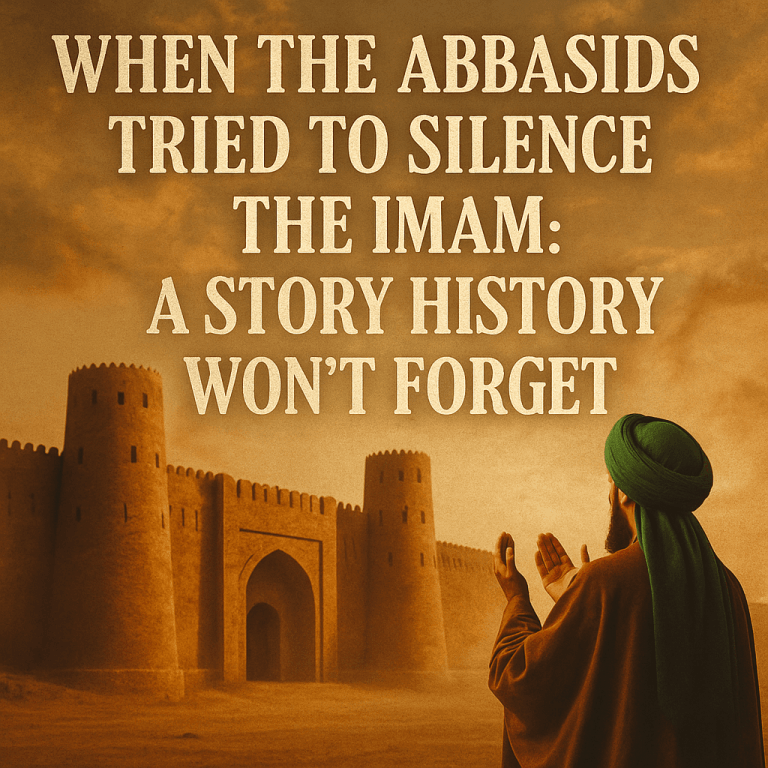They had the power. The soldiers. The spies. The plan.
And yet—they failed. Not once. But twice.
The Abbasids, one of the most powerful caliphates in Islamic history, feared something they couldn’t fully understand: the quiet, steady presence of the Shia Imams—and the mysterious promise surrounding the last of them, Imam Mahdi (A.S.).
A Threat the Throne Couldn’t Ignore
To the average Abbasid ruler, the Shia Imams were more than just scholars or spiritual guides. They were magnetic. Respected. Followed. Loved.
And dangerous—for those in power, that is.
The idea of a savior from the Prophet’s lineage who would one day rise to end injustice? It was enough to keep any tyrant up at night. Especially when whispers started circulating through the streets of Samarra, where Imam Mahdi (A.S.) was said to be quietly residing.
Samarra: The City That Held a Secret
Samarra wasn’t just another capital city. For a while, it was a strange mix of military control and hushed spiritual excitement. Imam Mahdi (A.S.) lived there for a period no one can pin down exactly. What’s known is that many people—mostly followers—found their way to him.
They didn’t shout his name in the markets. They didn’t chant. But they came. Quietly. Respectfully. With gifts, questions, and hopes.
And soon, the Caliph’s palace began to hear echoes of this silent pilgrimage. And it didn’t like what it heard.
Three Agents, One Mission, and a Doorway to the Unseen
Caliph al-Mu’tadid didn’t hesitate. He chose three trusted agents. Trained. Quiet. Ruthless. Their instructions? Infiltrate a specific house in Samarra. No names. No questions. Just enter, and if anyone’s there—end them.
One of those agents was Rashiq. And what he saw inside that house would haunt him for the rest of his life.
They approached the house. A black servant sat near the door, weaving. Calm. Unbothered. “Who’s inside?” they asked.
“The owner of the house,” he replied, eyes not even lifting from his hands. Cold.
They entered.
A Room That Felt Like Another World
The room was still. Almost sacred. A curtain, freshly hung, divided the space. When they drew it aside, they weren’t ready for what lay beyond.
A pool of water—deep, vast, as though an ocean had decided to settle inside a modest home. And there, floating serenely on a woven mat, stood a man. Dressed simply. Face radiant. Lost in prayer.
He didn’t even flinch.
Rashiq watched as the first agent stepped forward—and disappeared beneath the water. The second tried, and suffered the same fate. Rashiq pulled them both back, soaked and stunned.
“I don’t understand,” he whispered to the man. “We didn’t know. We didn’t mean… whatever this is, forgive us.”
But the man—Imam Mahdi (A.S.)—never turned. His prayer continued, untouched by the chaos.
Back to Baghdad, Empty-Handed and Shaken
They returned to the Caliph in silence. Pale. Drenched. Shaking.
“What did you see?” he demanded.
They told him—everything.
And his response was simple: “Speak of this again, and you’ll lose your heads.”
None of them ever did. Not while he lived.
The Abbasids Weren’t Done Yet
A second mission was planned. Bigger. Bolder. A full battalion surrounded the same house. This time, the Imam was in the basement—sardab. They heard his voice reciting the Quran. Calm. Peaceful.
They waited.
And as they waited, he walked right past them. Some saw him. Some didn’t. No one reacted.
“Why didn’t you move?” the commander snapped.
“We thought you’d give the order.”
“I didn’t see him!”
“We thought you did…”
But by then, it was too late. He was gone.
When Power Isn’t Enough
They had everything a regime could need—troops, secrecy, strategy.
What they didn’t have was permission.
That’s what made this story linger. It wasn’t about soldiers or miracles. It was about the limits of human power when it collides with something greater. When destiny, or God, simply says: “No.”
Was It a Miracle? Or Something More?
The mat floating on water. The silence in the room. The unflinching prayer. It defies physics, maybe even logic.
But to those who believe in the Imams, these weren’t fairy tales. These were signs—of protection, of sanctity, of truth.
Rashiq: The Man Who Tried, and Believed
Rashiq wasn’t a believer when he entered that house. He was a tool of the state.
But he left it quiet. And humbled.
He never raised a hand again.
Final Thought: You Can’t Assassinate a Promise
This wasn’t just a failed mission. It was a reminder that some things—some people—are beyond the reach of empire.
Imam Mahdi (A.S.) wasn’t just a man. He was a promise.
And history has shown: you can delay a promise, but you can’t destroy it.



